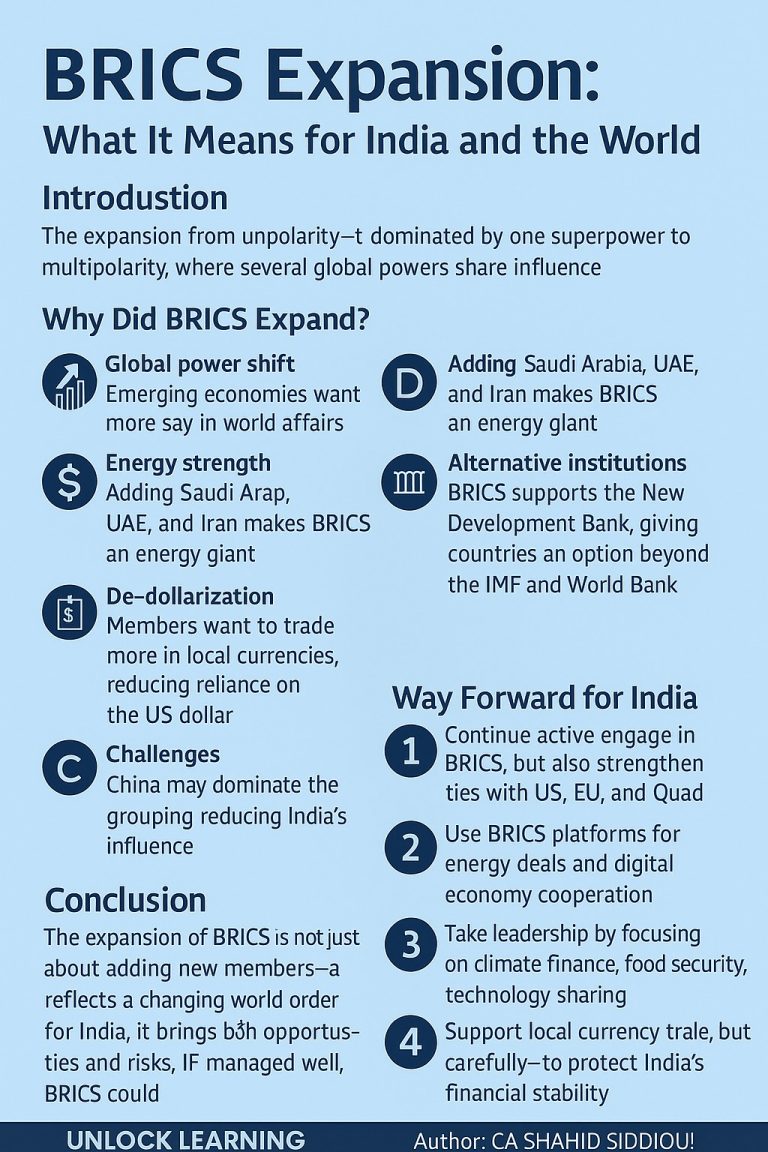🛢️ Why India Must Recalibrate Its Energy Diplomacy: Russia Sanctions, Supply Risk & Strategic Autonomy
By Shahid Siddiqui | October 2025
🌍 Introduction
In a rapidly shifting geopolitical landscape, the global oil market once again finds itself at the crossroads of power politics. The United States has announced sweeping sanctions on Russian energy giants Rosneft and Lukoil, aiming to tighten economic pressure on Moscow amid ongoing international tensions.
While the sanctions primarily target Russia, the ripple effects are being felt far beyond — especially in major import-dependent economies like India and China. As reported by Reuters and The Financial Times, these sanctions are compelling both Asian giants to rethink their crude oil procurement strategies to avoid exposure to U.S. secondary sanctions.
⚖️ India’s Energy Dependence: The Balancing Act
India imports nearly 85% of its crude oil requirement, making it one of the most import-reliant energy consumers in the world. Since the outbreak of the Russia-Ukraine conflict in 2022, Russia emerged as India’s second-largest oil supplier, providing discounted crude that helped cushion inflation and fuel costs.
However, the new wave of U.S. sanctions threatens to disrupt this delicate balance.
-
Major refiners like Reliance Industries (which has a long-term agreement with Rosneft) are reportedly recalibrating their purchase volumes to stay clear of U.S. restrictions.
-
Smaller state-owned refiners are adopting a wait-and-watch approach, wary of potential backlash on dollar-denominated transactions and global insurance cover for shipping.
This is not merely a commercial concern — it has deep geopolitical and economic implications.
🔍 The Geopolitical Ripple Effect
The U.S. sanctions represent more than just a financial measure — they are a strategic tool to reshape global energy flows and isolate Russia. But they also expose a key vulnerability in the global south: dependency on external powers for critical resources.
For India, the dilemma is profound:
-
Aligning too closely with Russia risks alienating Western partners.
-
Complying too rigidly with U.S. sanctions could undermine energy security and price stability.
This tension underscores India’s ongoing effort to maintain “strategic autonomy” — a principle that seeks to balance relations between the West and traditional allies like Russia.
💡 China’s Parallel Response
China, facing similar pressures, is also quietly reducing exposure to sanctioned Russian oil firms. Reports suggest Beijing is diversifying supplies through state-backed intermediaries and exploring grey channels for settlement outside the U.S. dollar framework, such as the yuan-based payment systems.
The combined caution from India and China — two of the world’s largest oil importers — could significantly alter global oil flows and pressure Russia to offer steeper discounts or find new buyers in Africa and Latin America.
🛢️ What This Means for India’s Refining & Energy Strategy
If Russian imports decline sharply, India will need to pivot towards Middle Eastern suppliers (Saudi Arabia, Iraq, UAE) and possibly the U.S. and Africa to bridge the gap. But this realignment will not come without cost:
-
Higher crude prices could strain India’s fiscal balance.
-
Currency depreciation could amplify import bills.
-
Refinery adjustments may be required as Russian crude (Urals) is chemically different from Middle Eastern grades.
To offset these risks, India might accelerate domestic refining expansion, renewable integration, and strategic oil storage capacity — a policy shift already visible in government plans.
🧭 Strategic Autonomy in Energy Diplomacy
India’s approach to energy diplomacy must now evolve beyond transactional trade. The goal should be long-term resilience and diversification:
-
Energy diversification — Broaden sourcing across regions to avoid over-dependence on any single supplier.
-
Currency innovation — Promote rupee or local-currency settlement mechanisms to bypass global payment disruptions.
-
Investment diplomacy — Secure upstream oil and gas stakes in friendly nations (e.g., Africa, Latin America).
-
Green transition balance — Use this geopolitical moment to strengthen India’s renewable and nuclear energy roadmap.
This would allow India to maintain autonomy while safeguarding economic stability in a volatile global market.
📉 Domestic Implications
The immediate concern lies in fuel prices and inflation. Any supply disruption or price surge in crude will quickly reflect at petrol pumps, impacting transportation, manufacturing, and food inflation.
-
Refinery profit margins may shrink as they shift to higher-cost suppliers.
-
Export-oriented refiners like Reliance could face narrower spreads if access to discounted Russian oil diminishes.
-
Government subsidy and fiscal management may again come under pressure if global oil prices cross $100 per barrel.
This highlights the tightrope India must walk — balancing political alignment with economic pragmatism.
🕊️ Conclusion: Navigating the New Energy Order
The U.S. sanctions on Russian oil are more than a punitive measure — they are a recalibration of global power through energy. For India, the challenge is not just about finding cheaper barrels but about defending its strategic space in a world where energy and politics are inseparable.
India’s future energy policy must blend pragmatism with principle — protecting national interest without succumbing to great-power pressure. Strategic autonomy in the 21st century will not just be about diplomacy — it will be about how nations secure, pay for, and manage the lifeblood of modern economies: energy.
📰 References:
-
Reuters, Financial Times (October 2025) — U.S. Sanctions on Russian Oil Firms: Impact on India and China.
-
Times of India — India’s energy security and global market impact.


